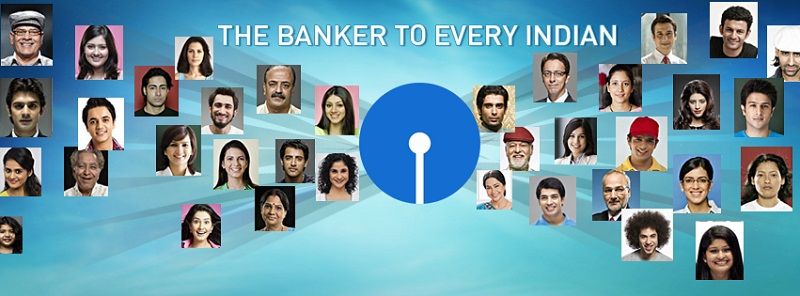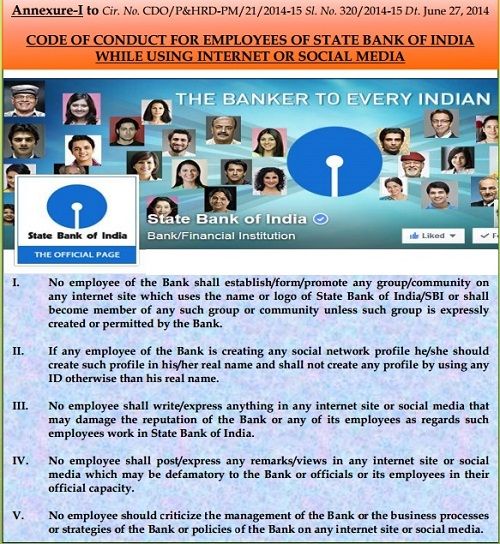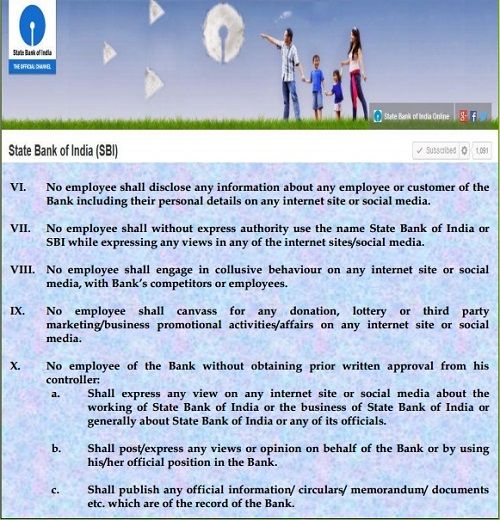
The oldest commercial bank in the Indian subcontinent and one of the big four banks of India – State Bank of India has come up with a bizarre social media policy or code of conduct for its employees on the medium. Initially reported by The Hindu, the bank is pressing employees to accept a social media policy, styled ‘Code of conduct for employees for expressing views in social media’.
A circular was issued by the bank on June 17 and the same is now being circulated digitally in the bank’s Human Resource Management System portal. It is said that all employees are required to submit online their acknowledgement of the circular, which will be stored digitally in the portal. The process has been made mandatory for new recruits while setting up their profile on the portal the first time.
While the bank understands the importance of social media in today’s times, it has decided to carry out disciplinary proceedings and impose penalties. The code shall also be applicable to all permanent and contractual employees.
What does the social media code state
The below screen grabs are from the circular that SBI had circulated with 10 major guidelines on June 27, 2014.
Required and disturbing parts of the social media code
Issuing a social media policy in today’s times isn’t a unique thing. To protect against online disasters and reputation management, today brands are arming themselves with a ‘social media policy’. Basically these are a set of guidelines on what employees can say and what they can’t on the medium that at times can kill a brand in no time.
Out of the 10 guidelines that SBI has listed, points III, V, VI, VII and X are understandable. Even though one might think that they are a bit weird, we can see that a brand like SBI is playing cautiously.
The bank that that a large presence on Facebook, Twitter and YouTube today had a disastrous start on Twitter. The foray into ‘Twitter’ with the hashtag ‘sbiconnext’ intended to provide updated information on the bank’s products and services, promptly sparked off a deluge of embarrassing complaints from customers.
“We were not able to handle the kind of queries that were put up on a daily basis,” said the official. The bank had launched the twitter account without anticipating the complaints. “You need quick back-up support as people tweeting don’t have patience. It also leads to bad publicity.”
But clauses like I – “No employee of the Bank shall establish/form/promote any group/community on any internet site which uses the name or logo of State Bank of India/SBI or shall become member of any such group or community unless such group is expressly created or permitted by the Bank.”
and II – “If any employee of the Bank is creating any social network profile he/she should create such profile in his/her real name and shall not create any profile by using any ID otherwise than his real name.” are really bizarre and clearly show how the bank wants to control its employees behavior on social media even in personal capacity.
Creating social media profiles with real name is a dictate that not even Facebook is following anymore then why is SBI dictating them to its employees. Besides stopping employees from forming a group that is related to SBI is still understandable but stopping someone to join a group is unreasonable. How would SBI monitor fake profiles? Apparently, SBI doesn’t want any gossip to leave the doors of the bank or its employees to join social media communities that make fun of SBI.
Additionally putting guidelines like this – “No employee should criticize the management of the Bank or the business processes or strategies of the Bank or policies of the Bank on any internet site or social media.” only goes out to show that even though the bank which is out there to connect with people on the medium is really putting restrictions in the name of responsible and ethical behavior.
The bank however thinks that it isn’t curtailing the freedom of speech of its employees – “It is, however, desirable that all employees follow specific instructions/guidelines while communicating in social media in a more responsible and ethical way within the framework of the service rules/conditions.”
Earlier this year we saw India’s leading news dailies doing the same – formulating bizarre social media policies. Earlier The Hindu issued a social media norm that advised employees to refrain from sharing stories of other publications on social media platforms including Twitter. Later Times of India followed suit by asking its employees to hand over their Twitter and Facebook passwords so that the company does the hard job of social media posting, even after employees leave the company. But, following a massive outrage TOI tweaked its soial media policy a bit.
With the proliferation of networks and more Indians spending time on these networks, companies have started forming a strict social media policy that might hand over lawsuits for ranting about work. But curbing freedom of speech and expression of employees with bizarre clauses only shows the lack of understanding about social media by SBI, at a time when it is busy celebrating its first anniversary on Facebook!

